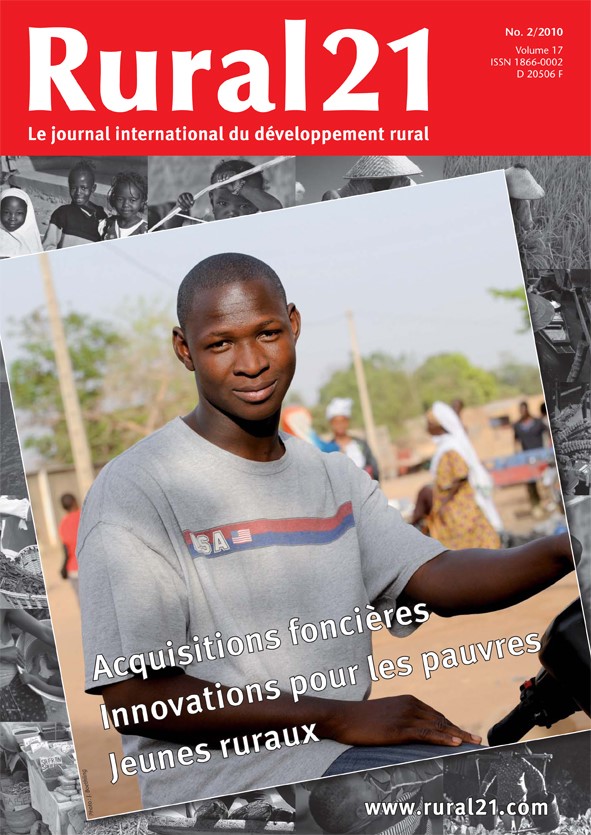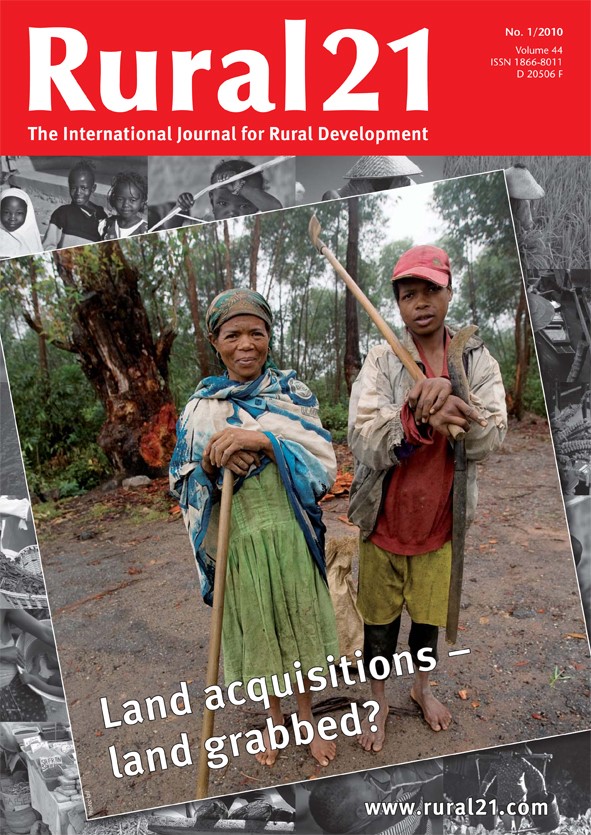Location
The international journal Rural 21 has dedicated more than 40 years to all topics surrounding rural development. Its ambition is to further those strategies and policies that strengthen rural areas of developing and newly industrialising countries and encourage their implementation. The journal addresses the complete range of relevant themes – from agriculture and fisheries via capacity building and education through to health and social security, energy supply and trade. Center-stage is always devoted to inquiring into how measures and strategies can contribute to global food security and to reducing poverty.
Rural 21 desires to further the dialogue between science and politics, the private sector, civil society and practitioners. Two platforms are designed for this purpose: Rural 21 in print is published four times a year, each issue highlighting a specific focus of rural development – this print edition is read in more than 150 countries. In parallel, Rural 21 online keeps the rural development community up to date on news and events, scientific findings and other print and online publications.
Rural 21 is published by DLG-Verlag GmbH in Frankfurt/Germany. Financial partners are BMZ (German Federal Ministry for Economic Cooperation and Development), GIZ (Deutsche Gesellschaft für Internationale Zusammenarbeit), DLG (German Agricultural Society – Deutsche Landwirtschaft-Gesellschaft), SDC (Swiss Agency for Development and Cooperation) and Helvetas Swiss Intercooperation.
The first issue of Rural 21 dates back to 1968. From 1974 to 2007, the journal was published in three languages entitled "entwicklung & ländlicher raum" / "agriculture & rural development" / "agriculture & développement rural". In 2008, the journal was relaunched as "Rural 21".
Members:
Resources
Displaying 226 - 230 of 319La responsabilité des pays industrialisés
La crise financière initiale s'est développée pour devenir, en 2008, une crise économique mondiale. Cette crise non seulement exacerbe le problème aigu de la famine en réduisant toujours davantage le pouvoir d'achat des populations pauvres, mais encore menace de limiter pendant des années les possibilités de combattre la famine à long terme au moyen d'investissements et d'innovations.
Eau et adaptation au changement climatique
Le groupe des pays en développement est celui qui est le plus gravement menacé par les conséquences hydrologiques du changement climatique mondial. L'eau, qui constitue une ressource essentielle pour le développement, est affectée par le changement climatique de multiples manières complexes : variations de température et élévation du niveau des mers, changements intervenant au niveau de l'abondance des précipitations et fonte des champs de neige et des glaciers.
A threat to global food security
As the world continues to experience a severe food crisis, with over one billion people going hungry, land grabbing – the purchase or lease of land by wealthy, food-insecure nations and private investors from mostly poor, developing nations in order to produce food crops for export – is gaining momentum. Some governments and international agencies believe that the in? ux of money and technology can turn land grabbing into a win–win situation for all involved. But is this really the case?
Indigenous people are losing their livelihood
In many Asian, African, and South American nations, indigenous people are being driven from their homes: Government authorities are leasing hundreds of thousands of hectares of land belonging to indigenous people who only in the rarest of cases possess deeds to the land that are recognised by the authorities. Although in many cases their ancestors have lived on the land for centuries, these rights were never recorded in the land registries. The way of life and the livelihood of many indigenous peoples are severely threatened by their land being sold off.
New challenges for ACP countries?
Land is an asset of enormous importance for billions of rural dwellers in the developing world. Recent trends are prompting a massive increase in global commercial interest in land and natural resources, and this is creating unprecedented pressures on land resources, especially in developing countries.



